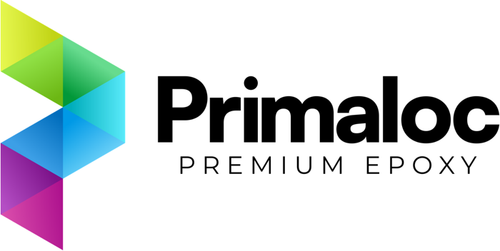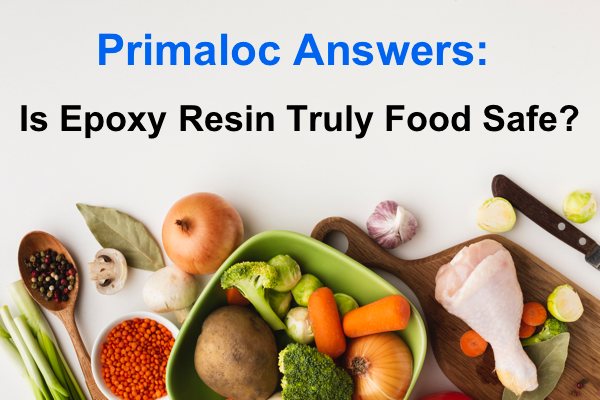Epoxy resin is frequently promoted as being food safe, and while there's truth to this claim, there's also a considerable amount of misunderstanding, which could lead to incorrect use of the material.
In this article, we'll discuss some of the myths of being "food safe" and provide clear information on the food safety of epoxy resin, detailing the circumstances under which it can be safely used.
We'll also be answering some common questions about epoxy resin related to food and drink consumption.
Is Epoxy Resin Truly Food Safe?
Yes, once fully cured, epoxy resin is considered food safe for incidental contact.
This means that if food briefly comes into contact with a cured epoxy surface, it won't become toxic or contaminated, as epoxy itself is non-toxic once cured.
However, there are essential aspects that determine the food safe state of epoxy resin surfaces:
-
Complete Curing: Epoxy's food safety hinges on its full cure. The curing process must be completed under the right conditions; otherwise, it may take longer than anticipated. Until it's fully cured, any contact between the epoxy surface and food should be avoided.
Learn more about epoxy and curing here.
-
Surface Condition: The condition of the epoxy surface is also vital. Any chips, cracks, or peeling should be addressed and repaired. Food safety can be compromised if the epoxy surface is deteriorating, as it could potentially release particles or not provide a stable, non-toxic place for food contact.
Remember the "5-second rule"? That's a safety myth! Always eat your food from clean surfaces—and keep those surfaces sanitized. Rewash or dispose of food that touches an unclean surface.
These aspects are fundamental to the food safety of an epoxy resin surface in your home or establishment.
Next, we'll explore questions we sometimes receive about the food safety limits of epoxy resin.
Epoxy FAQs: Food Safety
When it comes to epoxy, we receive a lot of different questions from various users. Below, we'll answer some of these questions related to food safety.
FAQ #1: Can You Cut Food on an Epoxy Countertop?
Not safely. While cured epoxy resin is generally considered food safe for incidental contact, it is not recommended to use an epoxy countertop surface as a cutting board.
Cutting directly on an epoxy surface can lead to scratches or gouges in which bacteria may begin to reside. Furthermore, sharp knives could potentially chip the epoxy or introduce harmful particles into your food.
For food preparation involving cutting, it's best to use a cutting board placed on top of the epoxy surface to maintain the condition of the epoxy countertop condition and to ensure food safety.
FAQ #2: Is Epoxy Safe to Drink from? (e.g., an Epoxy Cup)
Technically, it can be; however, we don't recommend it for hot drinks.
The key determining factor for this is the temperature of the beverage. Because a clean, smooth epoxy surface is food safe, one could use a cup to drink a warm, room temp, or cool beverage.
On the other hand, epoxy resin doesn't fare well with intense heat. Freshly brewed coffee, for instance, can be at temperatures well over the typical safe limit of 135°F for epoxy. When epoxy's temperature rises past 135°F, it can begin to soften, distort, or deform, making it unsafe as a drinking/eating surface.
It's worth noting that epoxy's safe heat limit varies by brand and quality. Be sure to use a high-quality epoxy resin for top-tier protection and consistency.
Want to make your own resin cup or tumbler? Take a look at our guide!
FAQ #3: Can Epoxy Be Used on a Cutting Board?
Epoxy can be applied to a cutting board, but only as a cosmetic element (often with colorful pigments). Any epoxy coating should be limited to sections of the board that won't be used for cutting.
Epoxy is not suitable as a cutting surface for food, because, despite its high resistance to various types of physical damage, it can still be scratched and cut by sharp knives.
Instead, use a conventional material for the cutting surface of your board, such as wood or plastic, and be sure to clean it after each use. Warm water and soap is typically sufficient, unless you've used it for raw meat, which necessitates proper disinfecting.
FAQ #4: How Can I Make Epoxy Resin Food Safe?
Just allow your epoxy to fully cure.
Premium epoxy resin will naturally become food safe once it has finished curing and become an inert material.
This doesn't make it safe to use as a dish, since sharp utensils can damage it, and high heat from extremely hot food can weaken it, but it won't contaminate or harm your food through contact, making it a safe material for eating at (such as with an epoxy table top).
As with any other surface, it's important to keep your epoxy finish clean. Learn how here.

FAQ #5: Does the FDA Certify Epoxy as Food Safe?
The FDA does not provide specific certifications for individual epoxy brands concerning their use in food contact applications. Instead, they offer guidelines regarding the safety of substances like Bisphenol A (BPA) found in various materials, including epoxy resins.
What Is Bisphenol A (BPA)?
Bisphenol A (BPA) is an organic synthetic compound that is widely used in the manufacturing of various types of plastics and resins. BPA is a key building block in polycarbonate plastic, a material known for its strength and durability, which is used in a variety of products including water bottles, sports equipment, and medical devices.
A Core Epoxy Ingredient
BPA is also found in epoxy resins, which are used as coatings inside food and beverage cans to prevent corrosion and contamination of the can's contents by blocking metal leaching into the food or drink.
Regulatory bodies like the U.S. Food and Drug Administration (FDA) maintain that BPA is safe at the low levels consumers might be exposed to through food contact.
Bisphenol A (BPA): Use in Food Contact Application
- "FDA’s current perspective, based on its most recent safety assessment, is that BPA is safe at the current levels occurring in foods."
- "BPA is also found in epoxy resins, which act as a protective lining on the inside of some metal-based food and beverage cans."
This summary reflects the FDA's position as outlined on their website, accurate as of April 20, 2023, showing confidence in the safety of BPA at the levels encountered in food products.
Primaloc Epoxy: Premium Epoxy for Premium Results
When it comes to epoxy resin, Primaloc Epoxy gets the job done. Our epoxy resin is premium-grade, with high performance in every category, including:
- Unmatched Strength: A Primaloc finish won't buckle, even under high pressure.
- Long-Lasting Resilience: Primaloc epoxy lasts for many years with minimal care, and can endure high-traffic environments with ease.
- A Crystal-Clear Coating: With its pristine, transparent appearance, looking at a cured Primaloc coating is like peering through a window.
- Food Safe Surfaces: Our epoxy is food safe once fully cured, making it easy to have peace of mind when working with food on/near epoxy surfaces.
Epoxy resin can be beautiful, strong, and long-lasting—which is why you shouldn't compromise on quality. With Primaloc Epoxy Resin, you get the ultimate finish in durability and visual appeal.
Protect your surfaces by giving them a rock-solid epoxy finish. Choose strong. Choose reliable. Choose Primaloc.




